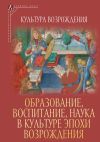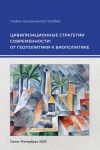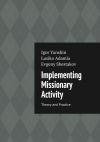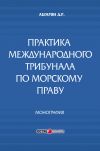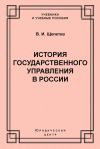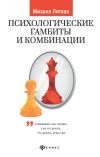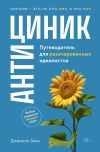Читать книгу "Education in Russia in the First Decade of the 21st Century"
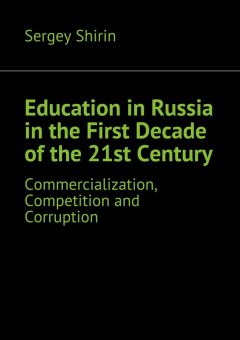
Автор книги: Sergey Shirin
Жанр: История, Наука и Образование
Возрастные ограничения: 16+
сообщить о неприемлемом содержимом
Education in Russia in the First Decade of the 21st Century
Commercialization, Competition and Corruption
Sergey Shirin
© Sergey Shirin, 2016
Reviewer Natalia Shveikina
Reviewer Irina Tiurina
Created with intellectual publishing system Ridero
Introduction
The new law “On education in Russian Federation” that was adopted in December 2012 is considered by public opinion and by some experts as the law on commercialization of education which is directed against the excessive governmental control. Such control might result in violation of competition rights in educational processes and relations. Under contemporary circumstances, an urgent academic issue is the question of competition in Russian education system which is on the world Top-20. Does the new legislation bring any novelties into this field? To answer this question, we need first of all to understand to what extent Russian education had been corrupted before the new legislation started to be worked on.
Some scholars have already done their research of some aspects of this problem. E.G. Popkova, V.V. Chashchin, and D.V. Bogdanov point out that the amplification of the requirements for quality and level of education of the labor force leads to the formation of modern mechanisms of interaction between the labor market and educational services, which is put into practice in personnel marketing, which fundamental task is the creation of an attractive image of an enterprise, as an employer, to ensure its human resources activities with optimal quantity and quality. M. Esyutina, C. Fearon, and N. Leatherbarrow highlight some of the quality issues associated with the Bologna process and reflect on how the statements underpin quality of learning and mobility in a European higher education area context. They explore some of the issues raised from the documentation and examine some early experiences and challenges from a leading Russian university as part of a wider examination of higher education in a Russian context. M. Luk’Ianenko, O. Polezhaev, and N. Churliaeva explain that engineering education in Russia is undergoing reforms, but the history of this form of higher education does not indicate that it will succeed in bringing it into line with current world standards, or even making it more able to contribute at a high level to Russian economic growth. Some aspects of Russian educational policy are mentioned in the publications devoted to the whole spectrum of cultural policy or to foreign cultural policy of Russia. But there are almost no works specially devoted to the issue of competition in Russian educational market yet, except some social and demographic aspects. Academic discourse provides us with no specific conclusions about the extent of competition in educational market in Russia under the circumstances of the former educational legislation and in the common European context.
Meanwhile, one can find some works devoted to the assessment of the level of commercialization in some other countries during that period of time. Many of them are based on methodology proposed by the European Association of Education Law and Policy (ELA). Before its annual conference in 2009, this association sent out a questionnaire concerning different aspects of commercialization of education to interested people in European countries. The answers helped some academics who were members of the association to make their conclusions relevant for different European countries. Russia was not in that list. This monograph is an attempt to apply this method to Russia as the object of research. It consists of the questions from ELÁs questionnaire and of the answers to them.
Part 1. Competition law in education
1. Is providing free education a commercial service according to national legislation?
The term “educational service” is found in the Law of the Russian Federation (RF) “On education” №3266—1, dated 10 July 1992 in the articles and clauses devoted to paid education. Only three times in the text of the Law use of the term concerns not only paid education, but also a free one. In part 8, Article 19, it is stated: “Educational establishments according to agreements and together with enterprises, institutions, organizations may provide training to students as an additional (including paid) educational service.” Similarly, in part 4, Article 50 one can read that students of all educational establishments have the right to “receive additional (including paid) educational services.” Thus, paid services are only a part of a more general notion of “educational services”. So, free education can be regarded as a service, too, and it’s providing, according to part 8, Article 19, is possible “with a license (permission) to the specified activity” only. In addition, clauses 16 and 17, Article 28 place establishing the general principles of financing of educational services and financing of federal government educational institutions and educational services itself among the credentials of federal bodies of state authority in the field of education.
It turns out that education belongs to the sphere of services, rather than to the social sphere, regardless of being paid or free.
However, as the Law stipulates that educational organisations may be established in the legal forms provided by the civil legislation for non-profit organizations only (Article11.1 of the RF Law “On Education”), commercial organizations are not allowed to carry on educational activities and, therefore, education is not regarded as a commercial service.
2. Is providing paid education a commercial service according to national legislation?
RF Law “On education” №3266—1 dated 10 July 1992 stipulates the right of educational institutions to attract additional financial resources, within the limits of the procedure established by RF legislation, by selling additional educational and other services specified in the statutes of educational institutions (part 8, Article 41). But the fact of providing paid education services does not mean their commercial nature. To become commercial, they are necessary to be provided not just for attracting additional financial resources, but for profit. According to part 2, Article 46 paid educational activities are not considered as business, if the derived income is used for covering costs of the educational process (including salaries), its development and improvement in the educational institution. If there is no business activity, one can not speak about commercial services.
Article 46 applies only to non-governmental educational institutions. Federal and local government agencies are not free at the disposal of revenues from providing paid educational services at all. Revenues may be used in accordance with the statutory objectives only. Therefore, such institutions generally can not be considered as ones carrying out commercial activities by means of paid educational services. Their services, rather, should be recognized as non-profitable ones. In addition, Article 47 of the Law “On Education”, which determines the list of business activities of educational institutions, does not include the paid educational services in this list.
3. Please describe other activities provided by educational institutions and their qualification as (public) services or otherwise?
In addition to the purely educational activities, educational institutions in Russia carry out research and development work, library science, publishing and printing activities, they are involved in organizing recreational activities, including theatrical shows, sporting, cultural, educational, and recreational and holiday events, etc. Educational institutions may also have non-commercial educational enterprises for students doing industrial practical work. All this kinds of activities are considered as non-commercial ones only if received income is reinvested in the educational process of the institution, and if such activities are stipulated by the institutions’ charters (clause 3, Article 47 of the RF Law “On Education”).
4. Are schools allowed to have commercial activities, and if affirmative, under what conditions?
The RF Law “On Education” determines that the educational institution is a legal entity. And according to the norms of civil law, it may be a party of economic transactions, i.e., to run business within the limits prescribed by the Civil Code of Russian Federation and other Federal Laws.
These limits are listed in Article 47 of the Law “On Education”:
Educational institutions may engage in business activities only stated in the Law. There are only a few activities from the entire spectrum of civil transactions: the transfer of property rights (lease), commercial representation (commission, agency), purchase and sale (in the form of retail sale), participating in particular partnership. However, here should be added other profitable secondary operations not associated directly with the production and selling of goods, works and services that are mentioned in the statute. This significantly extends the range of possible types of business activity.
Educational institution may only engage in the type of business activity specifically stated in its charter. By this fact educational institutions significantly differ from other legal entities that have the right to carry out any activity not prohibited by the Federal Laws, unless it contradicts the object and purpose of the activities, stated in the Charter of legal entity.
Educational institution is eligible to participate in the establishment of any commercial and non-profit organizations as a founder, shareholder, partner or co-investor (sharer).
Along with the general (educational) activities, state or municipal educational institution may also provide additional paid services:
* Supplementary education programs;
* Special courses and cycles of disciplines;
* Tutoring;
* Advanced study;
* Other services not stated in appropriate educational programs and state educational standards.
These services can not replace the general educational activities funded from the respective budgets. Otherwise, the money earned through such activities, shall be withdrawn by the founder (by state and / or municipal authorities) to its budget.
In addition, the founder or local government has a right to suspend business activity of educational institutions up to the court decision on this matter, as a lever that could restrain educational institutions managers’ enterprise, if it causes damage to the educational activities determined by the statute.
As a general rule, income from any activity of state or municipal educational institution shall be used by it in accordance with the statutory objectives, i.e. for organization and provision of educational process.
5. Is there any case-law on the applicability of competition law to activities of HEIs?
Strictly speaking, there is. Although it probably should be a matter of the activity of education and HEI related authorities, not of the activity of HEIs themselves.
Private HEIs, which are licensed by the Ministry of Education or – later – by Ministry of Education and Science, have the same rights as state-operated ones. Ministry occasionally issues acts that limit competition in higher education that impair the rights of private HEIs, in comparison, for example with Moscow State University. In such cases private institutions send the requirements to check such acts to Federal Antimonopoly Service (FAS). For example, in practice, as a result of the adoption of certain regulations which are issued by former Ministry of Education or the Ministry of Education and Science, it turns out that private educational institutions may participate in the competition for government grants and funds, but even if they win, they can not get budget money, because the Law “On Education” and the Budget Code contain certain amendments that do not allow to provide private institutions with such grants and funds. FAS responds to such appeals, explaining the contents of Article. 15 of the Law “On Protection of Competition”. This article prohibits to limiting competition in governmental, ministerial and departmental decisions.
Such decisions are contained in the Protocol №4 of the Expert Council of the Federal Antimonopoly Service of Russian Federation on the development of competition in education and science dated 4 June 2007, Protocol №6 of the Expert Council of the Federal Antimonopoly Service of Russian Federation on the development of competition in education and science dated 29 April 2008. Amendments to the RF Law “On education” and the Federal Law “On Higher and Postgraduate Professional Education” based on these decisions were drafted and referred to the Ministry of Education and Science and the Ministry of Economic Development of Russian Federation for further joint elaboration and introduction to the Government of Russian Federation.
In particular, with the help of FAS, they succeeded in liberalization of participation of private universities in the competition for state support of innovative universities in the framework of national project “Education”.
6. Is competition law applicable on the competition for students?
No, it is not. The RF Law “On Competition Protection” applies to relationships that concern the protection of competition, including the prevention and suppression of monopolistic activity and unfair competition, if Russia’s legal entities and foreign legal entities, federal bodies of executive power, bodies of state power of Subjects of Russian Federation, local authorities, other bodies exercising functions of those agencies or organizations, as well as state budget funds, the Central Bank of Russia, individuals, including individual entrepreneurs are involved in such relationships. However, individuals are subjected to this law, only when they do activities as business entities, to which students do not belong.
Competition of university entrants is regulated by the Order of the Ministry of Education and Science that approves the procedure of admission to the HEIs and a number of federal laws that establish privileges for certain categories of citizens.
7. Are state funded HEIs selling courses at market prices which are also provided by commercial educational institutions operating on the market?
The average cost of education at the state universities is higher than in private ones. Brands of state universities were created, as a rule, in Soviet times, and, in recent years, administrations of the universities actively used these brands, regularly raising tuition fees. Private universities, as a rule, do not possess such resource as a recognizable brand name.
8. Has there been case law on the extent of the activity of public interest of HEIs?
In Russian legal system, social relations are not regulated by case law. Therefore sources of legal support of non-profit activities of educational institutions are not precedents, but the Constitution of Russian Federation (Article 43 and 44), Federal Laws “On education” and “On Higher and Postgraduate Professional Education”, Presidential Decrees that are settled to solving urgent problems of the system (“On urgent measures of state support for undergraduate and graduate students of higher educational institutions”, “On some measures to strengthen public support for science and higher education institutions”, “On some measures to strengthen state support of young scientists – the candidates of science, and their supervisors”, etc.), the RF Government Decrees (which approve such major acts as State educational standards for higher and professional education, Regulations on the licensing of educational activity, “Standard regulations on educational institution of higher professional education (on HEI) of Russian Federation”), Programs, Concepts and other documents of a conceptual nature (the priority national project “Education”, the Concept of modernization of Russian education until 2010, the Concept of State Youth Policy, etc.), departmental acts issued by the Ministry of Education and Science (“The procedure for admission to universities” and others), acts of Subjects of the Federation (the rules relating to higher education in the Law “On education” of the Republic of Adygea, Karelia, Tatarstan, Chuvashia, Stavropol region, Kurgan, Novgorod and Sverdlovsk regions, although the higher professional education in accordance with Article 24 of Federal Law “On Higher and Postgraduate Professional Education” is related to the jurisdiction of the Federation, not of its subjects), administrative agreements (between the Federation and its Subjects, between the federal executive authority and the education authorities of the Subjects of the Federation, between founder and university), acts of nongovernmental agencies of educational governing (All-Russia Union of Rectors, regional councils of rectors of universities, associations of universities, etc.), local acts taken by universities within the limits of their competences (statutes, regulations, orders of rectors, decisions of Academic Councils, etc.).
A case law may regulate the activities of universities only if it is processed as the act in the form of resolutions or decisions of the Supreme Court, Supreme Arbitration Court or the Constitutional Court of Russian Federation. Under such case law, in particular, the rule of limiting age of head of department of HEI was repealed (the Decision of the Constitutional Court of Russia №19-P dated 27 December 1999 in the case concerning the constitutionality of the provisions of the Clause 3, Article 20 of Federal Law “On Higher and Postgraduate Professional Education”), it has been possible to enter the postgraduate and doctoral studies of some universities in case of having a diploma on higher education not acknowledged by the state (the Decision of the Supreme Court of Russian Federation №GKPI 99—563 dated 1 September 1999 on the application by S.A. Chernyshev on recognizing partially illegal Clauses 38 and 71 of the Regulations on the preparation of academic, pedagogical and scientific personnel in the system of postgraduate professional education in Russian Federation).
9. Which commercially attractive activities are performed by state funded HEIs?
Letting property on lease, Supplementary educational services, expertise.
10. Is competition law applicable on spin-offs? Is there any case law?
There are no precedent for it yet. HEIs and research institutes have got the right to act as founders of small innovative enterprises only with the adoption of the Federal Law №217-FZ “On Amendments to Certain Legislative Acts of Russia on establishing business entities by budget research and educational institutions with an aim of practical application (implementation) of the results of intellectual activities” dated 2 August 2009 Prior to that, such firms were in the “grey zone” of the economy, actually outside the legal framework.
11. Does liberalisation of the education market means that in the country universities and member states are loosing their freedom to cooperate and to stimulate cooperation between institutions?
The competitiveness of universities in a liberalized market of educational services is substantially determined by the level of development of inter-university – especially international – contacts. Therefore, there are special sections devoted to international cooperation on the websites of most universities, which show how well universities engage in this type of their activities. In addition, the lack of budget financing (which accompanies liberalization of the education market) encourages universities to open up foreign markets, and this may also encourage cooperation with foreign universities. That is why there is no lack of incentives for cooperation.
However, the same can not be said about the cooperation of universities within the country. Indeed, the situation of competition for applicants is not conducive to cooperation of universities which provide educational services for the same national market. So the news about examples of such cooperation is lively discussed in the academic environment, and such news often become a sensation. For example, news about the agreement on strategic partnership between Lomonosov Moscow State University and St. Petersburg State University was actively discussed in blogs by representatives of the university community in August 2009. As a rule, if such cooperation is carried out, it is based in the framework of the international projects but not on a bilateral basis.
Cooperation of universities in Russia sometimes takes the form of integration (as a result on the basis of several universities is established a federal or a national research university). However, this is not due to market mechanisms, but rather to state control of education. The market does not motivate strong universities to integrate, particularly if they would loose their brand names in case of it. In addition, the integration of HEIs can change the nature of the education market from competitive to oligopolistic one.
12. Have there been case law or rulings on fusions of educational institutions, and the consequences for the competition and choice of educational provisions?
President of Russian Federation issued a Decree №716 “On the Federal universities” dated 7 May 2008, whish is intended to establish national research universities by the RF Government in the form of autonomous institutions on the basis of the decision of the President of Russian Federation. The aim is to create in Russian Federation a network of research universities, in order to support the large-scale projects in the field of high-tech Russian economy sector, which will continue developing. The integration of educational institutions is one of the mechanisms for establishing the Federal universities.
The government deliberately tries to make these universities the most competitive in the country, appropriating funds for financing of innovative development programs. For the sake of it Federal universities receive additional rights and freedom. In particular, in accordance with Federal Law №18-FZ “On Amendments to Certain Legislative Acts of Russia on Issues of Activities of Federal Universities” dated 10 February 2009, federal universities may implement educational programs based on their own, not state, standards and requirements. The Federal universities are established in the form of autonomous institutions. They have a right to establish Limited Liability Companies and Closed Joint-Stock Companies for the realization of their scientific attainments.
Внимание! Это не конец книги.
Если начало книги вам понравилось, то полную версию можно приобрести у нашего партнёра - распространителя легального контента. Поддержите автора!